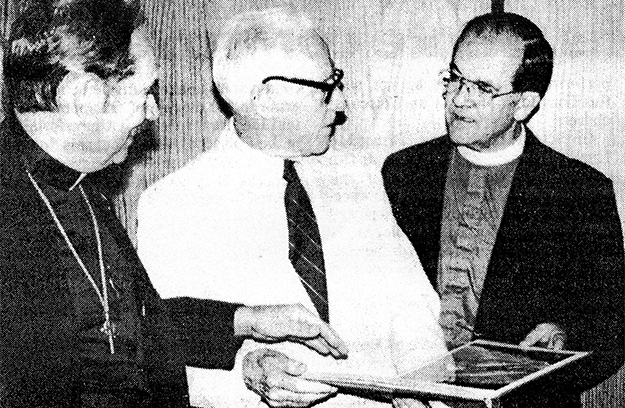Date: November 1986
By: The Rev. Steve Weston
Magazine: Crossroads
Page: N/A
There’s an organization called “Wings of Hope” that flies aircraft into places few men and women in the Episcopal Church have ever gone before. The mission, one of enterprise, often depends on a single-wing aircraft and a prayer. Then comes the will and the nerve to fly onto makeshift runways in forbidding terrain to bring medical supplies or provide emergency airlift and air evacuation for victims of trauma and disaster.
A Founder of this pioneer group is one of the original members of St. Luke’s Church, Dallas. His name is George Haddaway.
A non-profit, non-political charitable action group based in St. Louis, Mo., “Wings of Hope” helps equip missionary outreach units with air transportation and radio communication services in isolated areas of the globe. Haddaway, its founding member and board chairperson, was for 40 years the publisher of Flight Magazine.
For the last 25 he has seen his organization fly it’s way into remote areas of Kenya and New Guinea, Brazil and Peru, and most recently into Central America, and the countries of Guatemala and Honduras.
SUBTITLE: Flight operations
Haddaway, who grew up in Fort Worth as a member of St. Andrew’s Church, said his role is one of finding the means of rebuilding and re-conditioning single-engine aircraft, then enlisting different civic and religious groups in support of flight operations in remote areas where, he said, “human suffering and bare subsistence are a way of life.” Haddaway recently visited the Diocese of Dallas and the Rt. Rev. Donis D. Patterson on behalf of Bishop Leo Frade of the Missionary Diocese of Honduras. With him was the Rev. Canon Bill Buice, Frade’s assistant.
The diocese is in need of a Cessna U-206, a six-place single-engine aircraft to support communications and mission outreach in that Central American country. Air service can connect the 30 isolated congregations and their 11 priests; two deacons and 24 lay missionaries.
“Some of our congregations are up to eight hours driving time away from Tegucigalpa, the see city,” said Buice. “Two congregations can be reached only by aircraft or boat, two by horseback, and eight with a four-wheel drive vehicle.” He said twelve of the churches have neither telephone or postal service.
SUBTITLE: Radio and aircraft
The answer to human resource and communications problems posed by such isolation is a single-sideband radio net and an aircraft. Buice, an ex-U.S. Air Force pilot, has a current commercial license and instrument rating and Will supervise the aviation program in the Diocese of Honduras once it is begun.
“In Honduras,” Buice said, “We are building a native Episcopal Church with native clergy. There are between three and five thousand persons in our congregations, most located in subsistence farming communities.” Access to remote areas by the Diocese would help the Episcopal Church increase its assistance to the rural poor as it conducts literacy classes.
CAPTION:
WINGS FOR HONDURAS – George Haddaway (center), founder of “Wings of Hope,” discusses details of the Cessna single-wing aircraft his organization hopes to provide the Episcopal Diocese of Honduras with Bishop Donis D. Patterson. Pilot of the aircraft will be the Rev. Canon Bill Buice (left), who works closely with Bishop Leo Frade in the Central American diocese.
